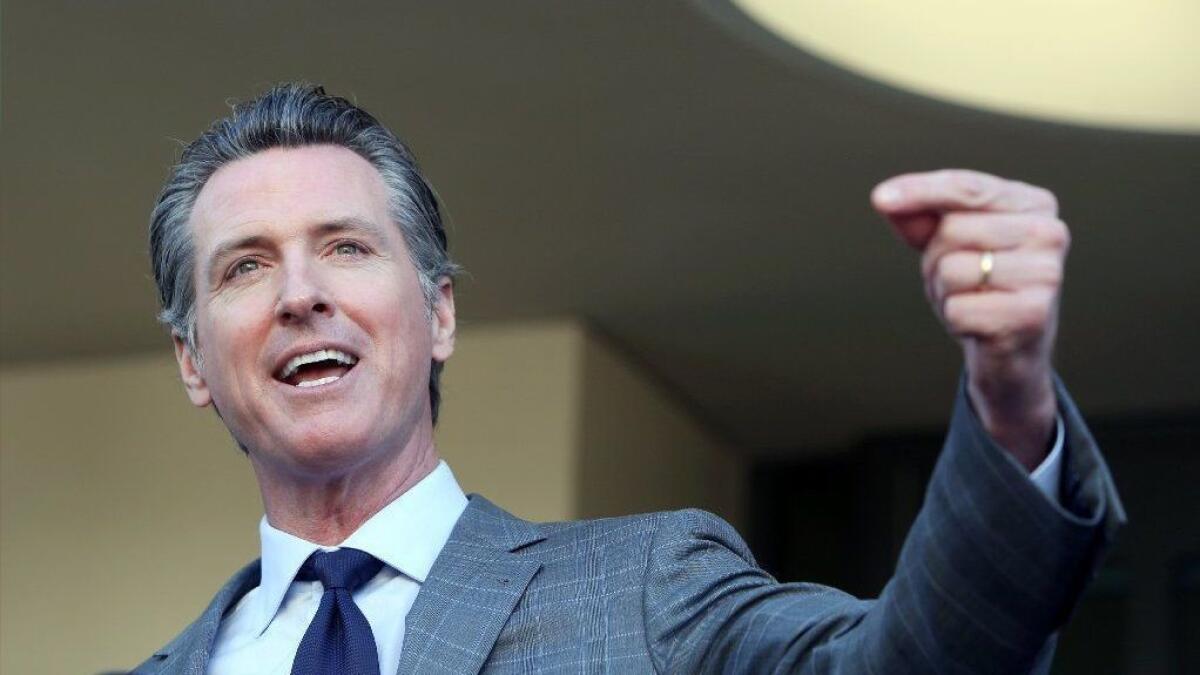Newsom fast-tracks legislation to hold charter schools to same standards as public schools

Reporting from Sacramento — A proposal championed by Gov. Gavin Newsom to require new transparency standards for charter schools across California was passed by state legislators Thursday, an effort that would align the campuses with guidelines followed by traditional public schools.
The legislation marks a symbolic shift in the long proxy war between teachers unions and charter-school backers over education policy, after back-to-back election cycles in which the two sides spent tens of millions of dollars on rival candidates in California’s top statewide races.
Senate Bill 126, which Newsom is expected to quickly sign into law, codifies a recent opinion from California Atty. Gen. Xavier Becerra that governing boards of charter schools should be subject to the same open-meetings laws and conflict-of-interest standards as public school districts.
Former Govs. Jerry Brown and Arnold Schwarzenegger vetoed earlier versions of the legislation, describing the measures as going too far. In comparison, Newsom made it clear last month he supported the plan and asked state Sen. Connie Leyva (D-Chino) to carry the bill, fast-tracking its passage through both houses in just seven weeks.
“Gov. Newsom is marking off a new approach that both reflects a different governing philosophy and in all likelihood his desire to respond to the politics that played out during the primary election,” said John Rogers, a professor of education at UCLA.
Newsom last year called for more transparency around charter school operations on the campaign trail months before a group of advocates including Netflix co-founder Reed Hastings and Los Angeles philanthropist Eli Broad funded a record-setting $23-million independent expenditure campaign in the governor’s race supporting former L.A. Mayor Antonio Villaraigosa and running attack ads criticizing Newsom. Teachers unions lined up behind the governor.
The move against Newsom perplexed education and political leaders because he had previously supported the charter school model as mayor of San Francisco. The effort fell flat when Villaraigosa failed to advance to the November election. It remains to be seen how education reformers, led by the California Charter Schools Assn., will respond to the new political dynamic in Sacramento.
“Will they continue to fight each measure as if no compromise is acceptable or will they try to take on a new tactic and work with the governor’s office to rationalize a set of legislation that hasn’t been updated in many years?” Rogers said.
Newsom spoke about his desire to address charter school transparency at a news conference last month, saying he wanted to move the bill “with a sense of urgency.”
“I want to get a transparency bill on my desk as soon as possible,” Newsom said, “something I’ve advocated for, something I want to push over the edge.”
The legislation came together following teacher strikes in Los Angeles and Oakland, which highlighted demands for smaller classrooms and higher wages, as well as more accountability and restrictions for charter schools.
In a statement, the charter school association praised Newsom’s leadership on the issue after nearly a decade of debate. The bill was the product of negotiations between lobbyists for unions and charters in recent weeks. In the end, the California Teachers Assn. endorsed the measure and the charter school group took a neutral position.
“His team brought all parties together to hammer out a deal where everyone had to compromise for the greater good,” said Carlos Marquez, CCSA’s senior vice president of government affairs.
Nathan Click, a spokesman for the governor, said the legislation fulfilled a key campaign promise.
“Gov. Newsom has long supported greater charter school transparency and believes that every school that receives public tax dollars should be held to basic standards of accountability and transparency,” he said. “This debate has lingered for far too long, and the governor took a leadership role in helping get this bill to the finish line.”
The legislation requires charter schools and entities managing charter schools to provide advance notice of meetings and to hold them in public, respond to public-records requests, and to disclose income and financial assets.
Eric Heins, president of the California Teachers Assn., said he welcomed the new governor’s approach. But he dismissed any notion of political retribution, saying the bill is “good policy.”
“I’m glad that we have a Legislature and governor that gets that and is moving on it,” Heins said. “It’s good for students and it’s good for democracy because it sheds light on how our money is being spent.”
Heins said the powerful teachers lobby was also pushing for laws to give local school districts ultimate authority to approve new charter schools and to require charters to operate in the districts that approve them.
Newsom has also asked state Supt. of Public Instruction Tony Thurmond to craft a report by July 1 detailing the financial effects charters have on traditional school systems.
“We’re beginning to see a ground shift and I hope it continues,” Heins said. “It’s a long time coming.”
Times staff writer Phil Willon contributed to this report.
More stories from Taryn Luna »
Follow @tarynluna on Twitter.
More to Read
Get the L.A. Times Politics newsletter
Deeply reported insights into legislation, politics and policy from Sacramento, Washington and beyond. In your inbox three times per week.
You may occasionally receive promotional content from the Los Angeles Times.











